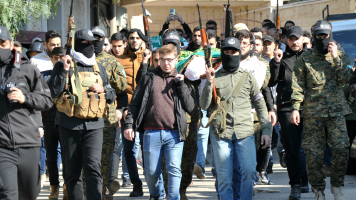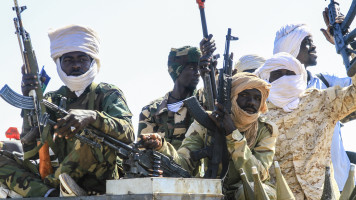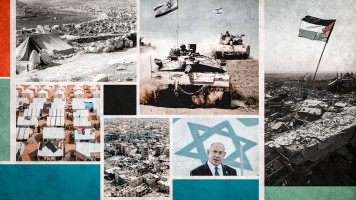
Will the ICC issue arrest warrants for Israeli officials?

The International Criminal Court (ICC) is considering issuing arrest warrants for senior Israeli political and military officials, according to Israeli media reports, including top government figures such as Prime Minister Benjamin Netanyahu, Defence Minister Yoav Galant, and Army Chief of Staff Herzi Halevi.
The charges are anticipated to be related to the ongoing war in the Gaza Strip, namely Israel’s “excessively harsh” military assault on the Palestinian population and its impediments to the delivery of aid to Gaza, which has led to starvation and the onset of famine. The court is also believed to be preparing arrest warrants against senior Hamas officials in the military chain of command.
In 2021, the ICC opened a war crimes investigation into Israel’s actions in the occupied Palestinian territory since 2014, including the West Bank, East Jerusalem, and Gaza. Israel, like the US, is not a signatory to the Rome Statue which established the ICC and does not recognise its authority.
"Law experts and human rights groups have repeatedly claimed that Israel's devastating war on Gaza is breaching international law"
Israel's war in Gaza
Law experts and human rights groups have repeatedly claimed that Israel’s devastating war on Gaza is breaching international law. Since it began in October, over 34,400 Palestinians have been killed, including over 14,000 children, while most of the blockaded Palestinian territory’s 2.3 million people have been forcibly displaced.
Amid intensive bombing campaigns that have left Gaza in ruins and severe shortages of food, water, fuel, and medicine, there have been repeated warnings that famine is imminent, while disease has spread.
The ICC case is separate from other cases at the International Court of Justice (ICJ), including the genocide claims brought by South Africa against Israel in Gaza at the end of 2023.
An interim ICJ ruling in January ordered Tel Aviv to take measures to stop committing genocidal acts and to guarantee that humanitarian assistance is provided to civilians in Gaza. Israel, however, is not complying with the ICJ’s orders, instead continuing its war and restricting desperately needed aid.
Since the Israeli government has refused to let the international court’s staff enter Gaza, it will take time for ICC Chief Prosecutor Karim Khan to carry out the full probe required to demonstrate the alleged war crimes perpetrated by Israel.
Consequently, Khan is likely to begin with the charge of starvation of Palestinian civilians in Gaza as the facts proving Israel’s obstruction of humanitarian aid are easily available.
Although Israel has not signed up to the ICC, the State of Palestine - a non-member observer state at the UN - became a signatory in 2015 thus granting the court jurisdiction to investigate war crimes perpetrated by members of the Israeli government in Gaza and the West Bank, even though they are not citizens of an ICC state.
The tribunal has the mandate not only to investigate but also to prosecute individuals allegedly responsible for war crimes, crimes against humanity, genocide, and the crime of aggression. The court becomes involved when states are unable or unwilling to prosecute crimes on their territory.
|
|
The ICC's challenges
Despite Israel and the US not recognising the court's jurisdiction, suspected Israeli officials would be at risk of arrest in other countries which are signatories to the Rome Statute of the ICC, who would be obliged to arrest anyone arriving in their territory who is under an arrest warrant.
If they are issued, warrants would also serve as an authoritative statement of rebuke of Israel’s unlawful acts in Gaza, sending a powerful message of due compliance with international humanitarian law and, most importantly, Israel’s obligation to protect the civilian population as an occupying power.
UN officials and legal experts have criticised the ICC for not acting on Israel’s war crimes in Gaza sooner, with Israel exerting political pressure on the globally renowned court.
“As with all cases at the ICC, this is a very sensitive political case,” Mark Kersten, assistant professor of criminology and criminal justice at the University of the Fraser Valley, told The New Arab, stressing that the court’s decision-making on Gaza is not particularly slow, considering the typically long timeline for judicial interventions by the ICC.
"It's very unfortunate. Israel will not permit ICC investigators to enter Israel or Gaza, and G7 states won't cooperate with the ICC"
The scholar, whose research focuses on the investigation and prosecution of international crimes, explained that the top court would move more quickly where countries were willing to cooperate, which is not true in the context of the Gaza war.
“It’s very unfortunate. Israel will not permit ICC investigators to enter Israel or Gaza, and G7 states won’t cooperate with the ICC,” he said.
Any potential action by the ICC concerning alleged Israeli crimes in Gaza also brings a unique set of challenges.
The ICC does not have its own enforcement body and therefore relies on member states to arrest war crimes suspects, freeze their assets, and enforce sentences. This has proven to be a major obstruction to prosecutions. Without a police force, the international court may not be able to arrest the accused or bring them to trial.
Targeted political and military leaders are potentially enabled to evade arrest warrants as long as they remain within the country since Israel does not accept the ICC’s jurisdiction. Any Israeli official who’s been issued an arrest warrant could also travel to the US and countries that are not ICC members, but they would avoid travel to EU states and many other countries in the world which are part of the ICC, so as not to risk possible arrest.
Kersten remarked that while the ICC cannot enforce warrants, their importance should not be dismissed in terms of limited freedom of movement of Israeli suspects. “At the very least, they have the effect of shrinking the world for those who have allegedly committed atrocities,” he argued, noting that those implicated officials would not be able to move as freely as before.
The Israeli government will not turn over any of its senior figures facing potential arrest as long as they remain in power. In fact, it would seek to obstruct the tribunal’s work if the accused are indicted. Tel Aviv has been reportedly lobbying Western countries and appealed to what Netanyahu called “leaders of free world” to stand against possible arrest warrants in an attempt to undermine any probe. The premier said nobody will stop Israel’s military actions, not even the ICC.
This lack of access for the ICC to investigate in Gaza or Israel makes the court’s mission a huge challenge.
“Because ICC investigators haven’t been allowed into Gaza, they’re not able to collect forensic evidence directly from the crime sites,” Gissou Nia, a lawyer specialised in international criminal and human rights law, told TNA, while pointing to reports of inspectors relying on evidence from humanitarian aid workers and medical staff on the ground.
|
|
Political pressure on the ICC
Kersten pointed out how critical cooperation is from other countries that may possess evidence in the form of documents, satellite imagery, or information obtained via intelligence networks to build a strong case. “States with some of the most sophisticated capacity like the US and the UK, of course, are unwilling to provide that for political reasons,” the criminal justice expert noted.
Some member states would predictably refuse to cooperate with the ICC or provide necessary information, hindering the court’s ability to conduct its investigation effectively.
The top court is also facing political pressure from powerful nations, with Israel’s closest ally Washington at the lead, which could influence the ICC’s capability of carrying out an impartial inquiry and prosecuting Israeli crimes. There have already been reports of diplomatic efforts to “thwart” the ICC prosecutor’s move to issue warrants.
Nia observed that bringing the alleged perpetrators before The Hague-based court would raise some “tough political and diplomatic questions” for ICC states where Netanyahu and his top aides are received.
“It will be very challenging, depending on who may be indicted in the leadership and their travel movements,” the human rights defender said. How the US and other Western states react to the arrest warrants will be something to watch closely, she continued.
While Israel has argued that “its own fully-fledged justice system”, instead of the ICC, should investigate and prosecute war criminals, the lawyer reaffirmed that the investigative and judicial body is mandated to proceed where states are not engaged in probing and holding those responsible for atrocities to account.
Alessandra Bajec is a freelance journalist currently based in Tunis.
Follow her on Twitter: @AlessandraBajec

![Biden has offered Netanyahu "unlimited" support in his war on Gaza [Getty]](/sites/default/files/styles/large_16_9/public/2023-10/GettyImages-1730842169.jpg?h=b609465e&itok=nR61M0oz)


